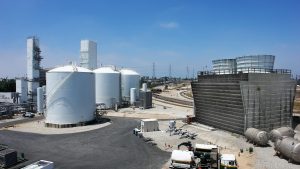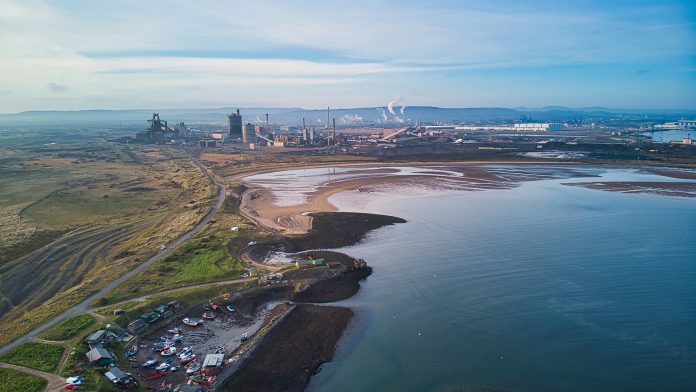bp has submitted a bid for its proposed large-scale green hydrogen plant, HyGreen Teesside, to the UK Government.
Today, bp has submitted a bid for its proposed large-scale green hydrogen plant, HyGreen Teesside, to the UK Government’s Hydrogen Business Model (HBM) and Net Zero Hydrogen Fund (NZHF). Both the HMB and NZHF seek to set up the UK’s low-carbon hydrogen economy and support commercial development. The company also established four new Memorandums of Understanding (MoUs) regarding the use of green hydrogen in businesses and communities.
bp’s planned green hydrogen plant
bp’s planned green hydrogen plant, HyGreen Teesside, has the potential to be one of the biggest green hydrogen facilities in the UK. The plant is targeting production by 2025, with an initial planned phase of 80MWe of installed hydrogen production capacity. There is a possibility that HyGreen Teesside could play a major role in assisting the UK with its net-zero goals, aiming to deliver up to 5% of the UK’s hydrogen target of 10GW by 2030, when its planned expansion of up to 500MWe is reached.
The green hydrogen plant will provide enough low-carbon hydrogen to power the equivalent of 10,000 Heavy Goods Vehicles, subsequently positioning Teesside as the UK’s first major hydrogen transport hub.
Louise Kingham, bp’s UK Head of Country and Senior Vice President of Europe, said: “We aim to produce green hydrogen that can help decarbonise industries, heavy transport, and even provide heat in homes. And we think HyGreen Teesside has the potential to transform energy use, the economy, and skills in the local region.
“The strong support we’re already seeing from customers reflects the need for us to deliver this for both Teesside and the wider UK. We’re not stopping there – our plans for mobility will also help drive the UK’s position in pioneering hydrogen and battery electric technology in transportation. Together, these can help deliver economic growth for the region and the home-grown hydrogen that the UK needs.”
In the region, the proposed hydrogen plant is drawing strong customer interest.

New Memorandums of Understanding signed
The company also confirmed today that four new MoUs have been signed with local industry for the potential use of green hydrogen in businesses and communities, building on two MoUs agreed upon previously.
One of the MoU’s signed was with Northern Gas Networks (NGN), which positions bp as the preferred supplier for the majority of hydrogen to NGN’s Hydrogen Village in Redcar from 2025. This involves switching the gas supply to clean-burning hydrogen for around 2,000 homes and businesses in parts of Redcar.
An MoU was also signed with Ensus, an operator of one of Europe’s largest renewable ethanol production plants at Wilton on Teesside. This potentially will allow hydrogen that is produced by bp’s proposed hydrogen plant in Teesside to be used at the ethanol production plants, replacing natural gas. The MoU with Ensus represents that there is a demand for hydrogen from hard-to-abate sectors.
Tees Valley Lithium, which plans to build one of Europe’s first lithium hydroxide processing facilities, also signed an MoU with bp regarding the potential use of hydrogen to support its objective of supplying the world’s lowest carbon lithium hydroxide. This will assist in the decarbonisation of Europe’s production of electric vehicle (EV) batteries.
A new MoU with Sembcorp Energy UK was signed for the supply of green hydrogen to explore decarbonisation options for some of its assets at Wilton International on Teesside.
MoUs were previously signed for the potential supply of low-carbon hydrogen from HyGreen Teesside or bp’s H2Teesside CCUS-enabled hydrogen plant with CF Fertiliser and Venator. The company’s planned hydrogen plants, and growing customer interest, support bp’s goal of creating a low-carbon hydrogen centre in the Northeast of England.
Grant Pearson, Chairman of Ensus UK, said: “The potential for hydrogen to be used in our existing process to further reduce emissions, as well as in combination with current products offers enormous opportunities. We are delighted to be partnering with BP in this initiative which will significantly enhance our overall sustainability.”
John Walker, Chief Executive of Tees Valley Lithium, added: “Tees Valley Lithium is delighted to be partnering with bp in this initiative, which will seek to further decarbonise TVL’s lithium hydroxide production at the Wilton International Chemicals Park, in Teesside, UK.
“TVL will source high-value intermediate lithium products with a low embedded carbon footprint from around the world and will provide customers in the UK and Europe with an independent and sustainable supply of low-carbon battery-grade lithium hydroxide and lithium carbonate.”
Mark Danter, Senior Hydrogen Strategy Manager for NGN said: “We’re delighted to work with bp on our proposal to switch the gas supply in parts of Redcar to hydrogen from 2025. Locally produced green hydrogen is vital to our plan and will make parts of Redcar self-sufficient, whilst creating jobs and investment in the area.”
Earlier this year, renewable energy company Masdar, based in Abu Dhabi, signed an MoU to collaborate on bp’s hydrogen plant, HyGreen Teesside. bp has also implemented a range of green skills initiatives on Teesside, which aim to support the project. This includes funding for the new Clean Energy Education Hub at the Redcar and Cleveland College, which will assist in delivering green skills development opportunities for the community.
Decarbonising heavy transport
bp is currently leading the bidding for support from Innovate UK as part of the Zero Emission Road Freight Demonstration (ZERFD) programme. This will help establish a network of hydrogen refuelling and electric charging hubs, alongside a supply chain based near Teesside. The ZERFD bid will assist the servicing of a core fleet of hydrogen fuel cell and battery electric trucks supplied by HyGreen Teesside to help decarbonise heavy transport in the region.
The company also aims to develop H2Teesside, one of the UK’s largest blue hydrogen production facilities recently shortlisted for UK Government support as part of the BEIS CCUS cluster sequencing Phase-2 process. Together, bp’s two proposed Teesside projects could deliver up to 15% of the UK Government’s goal of developing 10GW of hydrogen production by 2030.









